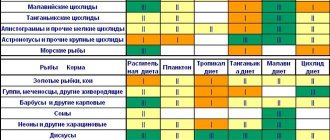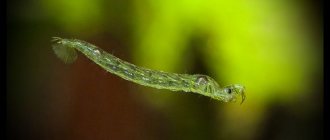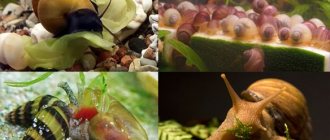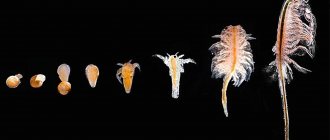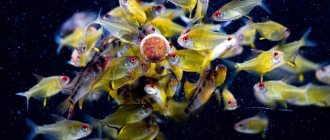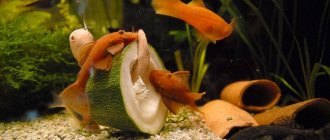Quickly navigate to the article
- 1 Why should you not overfeed your fish?
- 2 How can you tell if a fish has eaten too much?
- 3 Why are the fish hungry all the time?
- 4 What to do if the fish has eaten too much? 4.1 What to do if you overfed your cockerel?
- 4.2 What to do if you overfed your goldfish?
- 4.3 Other interesting articles
The biggest problem for new aquarists is overfeeding the fish. And the smaller the fish, the faster the problems begin. So, let's figure it out.
Why shouldn't you overfeed your fish?
The most important reason why you should not overfeed fish is harm to health. When overfeeding, it is very easy to damage any internal organs of the fish and the fish may die. This occurs due to the fact that a large amount of food enters the body and the fish’s organs can literally burst.
Most aquarium fish do not feel full and will eat only as much as is given to them.
This is especially true for viviparous fish. Personally, in my practice, there were cases when a fish’s belly burst right before our eyes and the fish died.
Signs
• Acute poisoning : the fish suffocates, floats at the surface of the water or lies on the ground, vibrates, or (in extremely severe cases) loses coordination and control of movements. This is often accompanied by loss of balance. Sometimes the color intensity increases. The eyes are glassy and motionless. Usually most or all fish are affected and within a short period many of them die. However, similar symptoms can be attributed to other reasons - for example, severe hypoxia. A specific diagnosis is often confirmed by circumstances, i.e., by the existence of a possible cause of toxicosis. For example, fish suddenly get sick after a water change. If the new water is in good agreement with the old in terms of parameters such as hardness, pH and temperature, then one should suspect contamination of the tap water with toxic substances. If poisoning occurs shortly after the appearance of some new decorative item in the aquarium, then it should be assumed that it is the source of the toxins. • Chronic poisoning : symptoms are usually non-specific and develop over time. They can also mean many other problems. These include signs such as loss of appetite, rapid breathing, vibration, standing in one place, glassy, staring eyes, increased vulnerability to infections such as fungus, fin rot and excessive production of skin mucus. Typically, not all fish are affected equally. Some fish may die, but these are only isolated cases. Cause. Many substances are toxic to fish. Some of them - ammonia, nitrites and nitrates - are products of the nitrogen cycle and are formed naturally in the aquarium (nitrogen waste). Other toxic substances can come from tap water, such as chlorine, chloramine and insecticides, which are used to kill bacteria and invertebrate animals present in drinking tap water. Heavy metals such as lead and copper are also sometimes present in tap water. Many medications can be poisonous to fish under certain conditions (for example, in excessive doses, when mixed with other medications, or for particularly sensitive fish;). A common reason for toxic substances entering aquarium water is inappropriate decoration and equipment of the aquarium.
- Metals can form toxic salts when in salty or acidic water.
- Stones may contain toxic compounds.
- Rocks or flower pots from the garden may be contaminated by chemicals used in gardening.
- Many types of plastic release toxic substances when immersed in water. Therefore, you should only use plastic items that are specifically designed for aquariums or food products.
- Paints, varnishes, glues and dyes are poisonous unless they are specifically designed for use in an aquarium.
- Wood coated with varnish can poison those fish that have the habit of chewing wood, for example, some catfish and yapy Uaru.
- Unsuitable plants - including some plants sold for aquarium use - such as Dieffenbachia.
- Foods, if not stored properly, can sometimes lead to aflatoxin poisoning. In addition, the aquarist himself or his family members may accidentally introduce various toxins into the aquarium.
- Paint or chemical fumes, tobacco smoke, household insecticides (such as fly spray), and aerosol polish can all enter the water through the surface or through the air pump.
- Aluminum pans or utensils made from other metals may contaminate the peat extract they cook with.
- Soap, cleaning products and other substances can get into the aquarium on equipment, decorative items or on your hands. The above list cannot be considered exhaustive - it is a listing of the most common causes of toxicosis.
How can you tell if a fish has eaten too much?
It is quite easy to understand that a fish has overeaten. Regardless of the type of fish, it exhibits a number of signs:
- Bloating;
- Floats strangely;
- Begins to actively consume air.
Below is an example of overeating fish in the photo.
Overeating in fish
My dad nagged me a couple of times about the fact that I don’t feed the fish with live food. Like, while I was in Vietnam, he fed them, but I didn’t. Every week we went to the market for bloodworms. We should have hired a car with a driver from avto2.me, and not taken a minibus, by the way. And so, yesterday I found myself at the market and bought them some worms. I fell asleep a little yesterday and left it on the lid of the aquarium. This morning I threw in a new portion and sent the animals on a cryogenic journey. So, it looks like my gouramis have eaten too much. The fish’s tummies have become round (they’re just all over the place). What to do?
I went to Google Yandex and solve the problem. What if this is some kind of terrible thing? What if they have to be sent to the boarding house beregovoy-alushta.com in Crimea for recovery? In general, I asked Yasen Yandex what was wrong and what to do? The experts in the answers on Mail.ru a little stirred up my panic fears:
I don’t agree with the answer that fish eat as much as they need. The fish will eat as much as you give them, especially if these fish are similar to gold ones, etc. The fish need to do a fasting day once a week. An overfed fish can be distinguished by its large round belly, activity decreases, and yes, of course, it can die if it eats too much..
Die? Why is this happening all of a sudden? My gourami doesn't need to die. Hail to live forever!
Well, on Zoolife they remembered my favorite topic about cannibalism and guramimism in my fish. It turns out that they can die from overfeeding.
One of the reasons why fish die is overfeeding. It's easy to forget how small your fish really are, and that they don't have the same appetite as we do. Also, since feeding the fish is the main form of interaction with them, they of course expect at least a small amount of food when we approach the aquarium - and sometimes it is difficult not to give them food. However, it is important to remember that overfeeding your fish can have serious consequences.
Contrary to popular belief, most fish that die due to overeating do not die due to gastrointestinal problems. In fact, the main problem has nothing to do with overeating. Rather, problems arise if excess food is left uneaten and accumulates in the aquarium as waste. They decompose and can be extremely toxic to your fish and can also indirectly contribute to a cluttered aquarium. Common signs of overfeeding can be easily identified in any aquarium: cloudy water, algae growth, mold or mildew, and clogged filters are some of the most obvious indicators. (However, in my aquarium there seem to be no such signs)
If you are a fish owner or hobbyist and notice any of these signs in your aquarium, there are a few simple steps to take to ensure your fish are getting the proper and safe amount of food.
What to do if the fish has eaten too much?
I overfed my fish more than once and developed a number of rules for myself, which I will gladly share:
- Change water at short intervals. For example, I change 20 percent, then after 3 hours another 10 percent. And the next day another 15 percent.
- Along with the change, I collect the remaining feed.
- Increased aeration.
- Fasting day.
We will also consider the right paths for popular fish.
What to do if you overfed your cockerel?
As a rule, males live in small aquariums, so when overfeeding, the first thing to do is collect the remaining food.
The second step is to change the water. Ideally, the entire volume, if it is possible to take water from another aquarium. If this is not possible, make changes every 3-4 hours by 20-30 percent until you change the entire volume. If the aquarium is very small (up to 3 liters), then it is better to change 80% of the water and fill it with settled water. You can add aquarium chemicals for water treatment. In general, the volume of replacement depends on how much the fish were overfed. But the above values can be taken as average data.
The third step is a fasting day. After the change, do not feed the betta for 24 hours.
What to do if you overfed your goldfish?
The steps for overfeeding goldfish are the same as for bettas. The only difference is that for goldfish you need to increase the air supply, since when overfed, the fish begin to consume more oxygen to speed up their metabolism.
Prevention
Based on the above, you can draw up several rules necessary to prevent unnatural death of fish in an aquarium:
- Regular water change. Often, its condition can be determined by smell and color.
- Good air supply for the aquarium.
- Correct nitrogen metabolism.
- Balanced diet.
- Prune plants regularly.
- Introduce fish gradually.
- Consider the proximity of fish.
- As soon as the inhabitants begin to die from the disease, cure the sick in another aquarium. Disinfect the main one.
- Quarantine new fish (in a separate aquarium).
Aquarium water temperature
Most fish kept at home come from tropical countries. Most of our country can hardly be called tropical, so maintaining the temperature to which aquatic organisms are accustomed in their homeland is sometimes very difficult, especially in winter. In addition, sudden changes in temperature should be avoided. Prolonged violation of the required temperature regime, just like hypothermia or overheating, leads to disruption of the animal's metabolic processes and its possible death.
Troubleshooting:
- use of special aquarium heaters with a controller;
- select fish for one tank from similar temperature regions.
Oxygen in the aquarium
Fish absorb oxygen from the aquatic environment using gills. The concentration of pure oxygen in water is much less than in the air, and therefore a decrease in its amount very quickly affects the well-being of the fish.
Troubleshooting:
- Avoid excessive population density. There is one very conditional, but more or less valid rule - one liter per centimeter of the length of the fish’s body. That is, for ten individuals one centimeter long, approximately a ten-liter aquarium will be required;
- When the population exceeds the norm and at the first signs of oxygen starvation, it is necessary to use aeration of the aquarium. For this purpose, special aquarium compressors are used.
Aggressive neighbors in an aquarium
Some aquarium inhabitants have more “complex personalities” than others. This must be taken into account when selecting the composition of hydrobionts.
What you need to know when choosing aquarium fish:
- Is the fish territorial? Some fish, for example the Cichlids of Lake Malawi, occupy a certain area in the aquarium and strictly monitor the violation of its boundaries by other inhabitants, especially those similar in size and color;
- You should select fish of similar sizes. Rule: if a neighbor fits into the mouth, then it is not a neighbor, but food. Don't expect fish of very different sizes to become friends;
- Avoid predatory fish. They need certain conditions of detention and even among themselves they rarely live peacefully;
- Try to choose fish from different ecological niches. That is, combine catfish that live and feed on the bottom with animals that prefer the upper and middle layers of water. Avoid food competition;
- Some species, such as Sumatran barbs, like to pluck the fins and whiskers of other species, so avoid putting them in the same tank as veil fish;
- When purchasing, be sure to consult with a specialist about the behavioral characteristics of the species you are purchasing.
